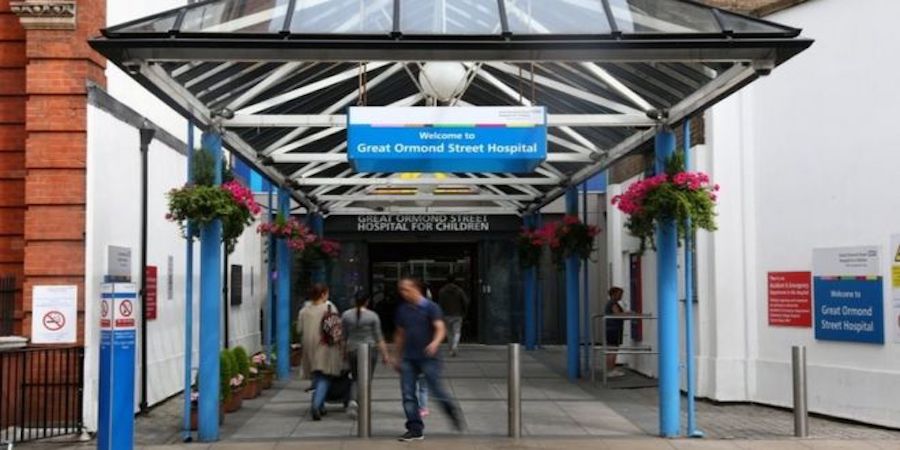- Study Says Most Parents Don’t Use Car Seats In Ride Share Vehicles Like Uber
- This 12-Year-Old Boy Is A Sophomore Aerospace Engineering Major!
- Fire Safety Experts Warn Of Hand Sanitizer Danger After A Mom and Kids Escape House Fire
- Recall Alert: Peaches May Be The Cause Of Salmonella Outbreak, 68 People Ill
- Summer Vacation In The Days Of COVID: Tips To Stay Safe
- How To Safely Grocery Shop During The Coronavirus Pandemic
- Michigan Teen With Vape-Related Illness Undergoes Double Lung Transplant
- Teen Kicks Off Anti-Vaping Campaign From Hospital Bed
- Teenager Receives Life Sentence For Strangling Sister To Death Over A Wi-Fi Password
- Toddler Falls To Death From 11th Deck of Cruise Ship
This Hospital Is Said To Be ‘Failing’ Intersex Children


A BBC investigation reveals that Great Ormond Street Hospital is not meeting care standards for intersex children,
A BBC investigation has found that some patients who had been born with sexual development disorders, and their families, had no access to psychological care.
Not all cases were even properly discussed before the patient had life changing, irreversible surgery.
Health regulator CQC is investigating these instances and the hospital said it was committed to working with seriously ill children.
Intersex, also known as disorders of sexual development (DSD), is when sex characteristics – including genitals, reproductive organs as well as chromosome patterns – do not fit into the typical notions of female or male bodies.
The BBC reported that it has learned that at Great Ormond Street Hospital (GOSH):
- There is currently no face-to-face psychological support for children and their families who have been referred in the last six months despite surgery continuing. The BBC understands tens of families are waiting for therapy. For several years not all children and their families have had access to face-to-face support, before having surgery
- Not all cases were discussed at full the multidisciplinary team meetings at GOSH
- Information about this surgery is complex but information given to parents is not in a written form that they can take away, to ensure proper comprehension prior to giving informed consent for surgery. The BBC has been told that this raises doubts as to whether parents have given truly informed consent on behalf of their child before irreversible surgery.
Over the last 10 years, standards and guidelines say DSD cases should be discussed by specialist teams of experts, in order to ensure the best possible outcome.
They also say that it is important that families and children should be seen by a psychologist.
Prof Ieuan Hughes, who is an emeritus professor of pediatrics at the University of Cambridge and an expert in hormone disorders told the BBC that DSD was a “very complicated area of medicine”.
The Prof said it was important that families got support from a psychologist prior to making decisions about surgery, so parents were fully aware of the life long-implications on children.
When asked if surgery should continue in hospitals not meeting the national standards, Prof Hughes told the BBC: “It seems reasonable to me to just take a pause, get the problem sorted and get back on track as soon as possible.”
When Joe Holliday was born in 1988, it was unclear if he was a boy or a girl.
During development in the womb, his genitals did not fully form and the child was born with a large hole in his abdomen.
The 29-year-old says that specialists at Great Ormond Street Hospital told his Mom he would be better being a girl because it was easier surgically and he would not handle being a man without male genitalia.
On Joe’s first birthday, his Mom put him to bed and the next day brought him up as Joella.
As recommended by the medical team, she changed all his clothes from blue to pink overnight.
The child featured in a BBC documentary in 1998, when he was 10 years old, which followed his family’s legal fight to get him recognized as a girl on his birth certificate.
But from 10 years old onward, Joella suffered from depression and anxiety. Joella self-harmed and attempted suicide.
“I had years of feeling like I was in a black hole and not knowing why,” he told the BBC.
In his 20s, he happened to come across his medical notes and read that blood tests had shown his chromosomes to be XY – genetically male.
He also learned that his testes had been removed when he was eighteen months old, despite being completely healthy, he said.
“I felt I feel like I lost such a large part of my life – 15 years of my life that I spent depressed and almost a recluse at one point,” he said.
At the time, the decision over raising Joe as a Joella was considered to be best practice, but nowadays most children now born with this condition are raised as a male.
He said that although the advice was different when he had his surgery 30 years ago, it was “not acceptable” that patients and their families were not being supported now.
Experts have told the BBC that Great Ormond Street Hospital for Children NHS Foundation trust is seen as the leading hospital for care for these kids and regional centers refer in for specialist opinions of the multi-disciplinary team.
In a statement, the hospital said that patients diagnosed at GOSH were discussed and treatment decisions were taken via these multi-disciplinary teams.
What does intersex mean?
- There are a few congenital variations of disorders of sex development
- Some traits may be visible at birth, others not until puberty and some variations in chromosomes may not be physically apparent at all
- Worldwide, up to 1.7% of people have intersex traits – this is according to the Office of the United Nations High Commissioner of Human rights









0 comments